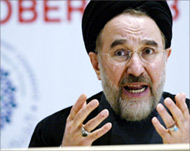EU ministers in Iran for nuclear talks
British, French and German foreign ministers have converged on Tehran with a proposal aimed at persuading Iran to dispel all doubts its nuclear programme could be used to make atomic bombs.

The EU ministers are visiting Iran less than two weeks before an October 31 deadline set by the International Atomic Energy Agency (IAEA) for Tehran to disprove US-led allegations it is conducting a covert nuclear arms programme.
“The IAEA resolution…imposed very serious obligations on Iran and it’s for Iran to show to (IAEA chief Muhammad) al-Baradai and the IAEA board in early November that it is complying,” British Foreign Secretary Jack Straw told reporters en route to Tehran. “Our trip is intended to encourage them to do so.”
Diplomats said the key issue in Tuesday’s talks would be whether Iran insisted on continuing its plans to master the entire nuclear fuel cycle, including enriching uranium. Recent signals from Tehran suggest possible moves to compromise.
Ministers’ arrival
German Foreign Minister Joschka Fischer arrived in Tehran a few hours before Straw while France’s Dominique de Villepin was due to land shortly before the talks begin on Tuesday morning.
Underscoring a notably softer tone from Iran in recent days over the nuclear issue, President Muhammad Khatami hinted for the first time on Sunday that Tehran could mothball uranium enrichment facilities it began building in 1985. Some Western powers fear they could be used to produce weapons-grade uranium.
 |
|
Khatami says everything will be |
Asked if Iran may stop enriching uranium, he told reporters: “We will do whatever is necessary to solve the problems.”
But a British official played down the prospect of a breakthrough at the Tehran talks.
“What we hope is that the net contribution of all these efforts is we end up with Iran abandoning whatever aspirations it has in the nuclear weapons stakes,” he said.
“We’re not going to judge it by whether there is a tangible result tomorrow. It may be that the tangible result is reflected in the al-Baradai report,” to the IAEA board on 20 November.
Electricity generation
Iran insists its sophisticated network of nuclear facilities is aimed at generating electricity, not making bombs.
Al-Baradai has warned Iran’s case may go to the UN Security Council if he is unable to verify in his November report that Iran has no intention of building nuclear arms.
|
Iran insists its network of nuclear facilities is aimed at generating electricity, not making bombs |
UN inspectors have found arms-grade enriched uranium at two Iranian facilities this year, but Iran blames this on contamination from machinery it bought on the black market.
Low grade enriched uranium is used as fuel in atomic reactors but highly enriched uranium can be used to make atomic weapons.
Diplomats said the EU ministers would demand Iran cooperate fully with the IAEA, accept tougher UN inspections and halt uranium enrichment.
In return, the ministers would offer to recognise Iran’s right to a civilian nuclear energy programme, give some technical assistance and guarantee Iran’s access to imported
fuel for nuclear power plants.
Possible breakthrough
A breakthrough on Iran’s nuclear programme would be a major coup for the three big European Union powers, whose opinions on the US-led war in Iraq differed markedly.
It was not clear whether their initiative was backed by Washington, which has tended to frown on any deal-making with Iran’s clerical leaders.
The EU foreign ministers will meet President Khatami, Foreign Minister Kamal Kharazi and Supreme National Security Council chief Hassan Rohani on Tuesday, diplomats said.
Al-Baradai, who has described the European initiative as a “win-win” scenario, was assured during a visit to Tehran last week that Iran would answer all the IAEA’s outstanding questions about its nuclear programme and was willing to accept tighter inspections.